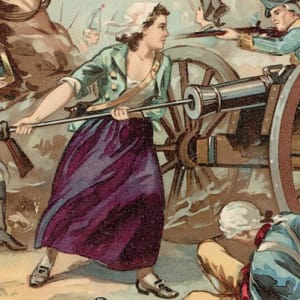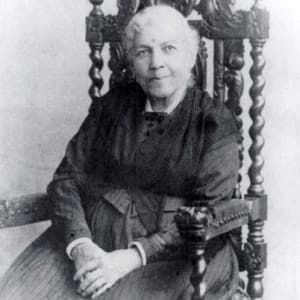
Molly Pitcher
Molly Pitcher was a patriot who carried pitchers of water to soldiers and helped with cannon duty during the American Revolution’s Battle of Monmouth.
Synopsis
Molly Pitcher was believed to have been Mary Ludwig Hays, born circa October 13, 1754, near Trenton, New Jersey. During the American Revolutionary War's Battle of Monmouth, she carried pitchers of water to soldiers, thereby earning her nickname. After her husband collapsed during the battle, she took over the operation of his cannon. Honored in 1822 for her bravery, she died in Carlisle, Pennsylvania, on January 22, 1832. There are many other women who also volunteered their service during the American Revolution and whose lives may have contributed to the legend of Molly Pitcher.
Legend or Composite Myth?
There are so many different legends surrounding Molly Pitcher that some historians believe her story is folklore or a composite of several people. Though there has been ample research done mostly by her descendants, independent review of the documents have led some historians to conclude that Molly Pitcher cannot be definitely identified. Most sources identify her birth name as Mary Ludwig, daughter of Maria Margaretha and Johann George Ludwig, and identify her first husband as William Hays (also sometimes referred to as John Hays), who was in the artillery and fought at the Battle of Monmouth.
Mary Ludwig, who is believed to have been Molly Pitcher, was born circa October 13, 1754, near Trenton, New Jersey. In 1768, she moved to Carlisle, Pennsylvania, where she met William (also known as John) Hays, a local barber. They married on July 24, 1769.
Battle of Monmouth
During the American Revolutionary War, Hays enlisted as a gunner in the Continental Army. As it was common at the time for wives to be near their husbands in battle and help as needed, Pitcher followed Hays back to New Jersey during the war's Philadelphia Campaign (1777-78).
Hays fought in the Battle of Monmouth in Freehold, New Jersey, on June 28, 1778, a brutally hot day. His wife was present as well, and she made countless trips to a nearby spring to fill pitchers of cold water for soldiers to drink and to pour over their cannons to cool them down.
As legend has it, the soldiers nicknamed her Molly Pitcher for her tireless efforts. But the legend only began with her new name. According to accounts, Mary witnessed her husband collapse at his cannon, unable to continue with the fight. She immediately dropped her water pitcher and took his place at the cannon, manning the weapon throughout the remainder of the battle until the colonists achieved victory. According to the National Archives, there was a witness documented her heroic acts, reporting that a cannon passed through her legs on the battlefield, leaving her unscathed:
"While in the act of reaching a cartridge . . . a cannon shot from the enemy passed directly between her legs without doing any other damage than carrying away all the lower part of her petticoat . . .She observed that it was lucky it did not pass a little higher . . .and continued her occupation."
With her actions on that day, Molly Pitcher became one of the most popular and enduring symbols of the women who contributed to the American Revolution.
Postwar Life
Mary remained with the Continental Army until the war ended, then moved back to Carlisle with Hays in April 1783. Following her husband's death, she married a war veteran named John McCauley and worked in the State House in Carlisle. She was honored by the Pennsylvania Legislature in 1822 for her wartime services, receiving an award of $40 and an annual commission of the same amount for the rest of her life. She died on January 22, 1832, in Carlisle, where a monument commemorates her heroic acts in battle.
Women of the American Revolution
There are many other women who also volunteered their service during the American Revolution and whose lives may have contributed to the legend of Molly Pitcher. Historians point to Margaret Corbin, who was in the same regiment with her husband John as Hays and her husband. Called Captain Molly, Corbin wore a uniform and when her husband was wounded on the firing line, she stepped in to fight. She was also wounded and captured by the British, but eventually released. Corbin was later reassigned to perform guard duty at West Point. Whether representative of one woman or a composite of many, Molly Pitcher is folklore character whose legend tells the story of women’s heroism during the American Revolution.




